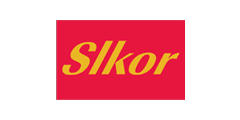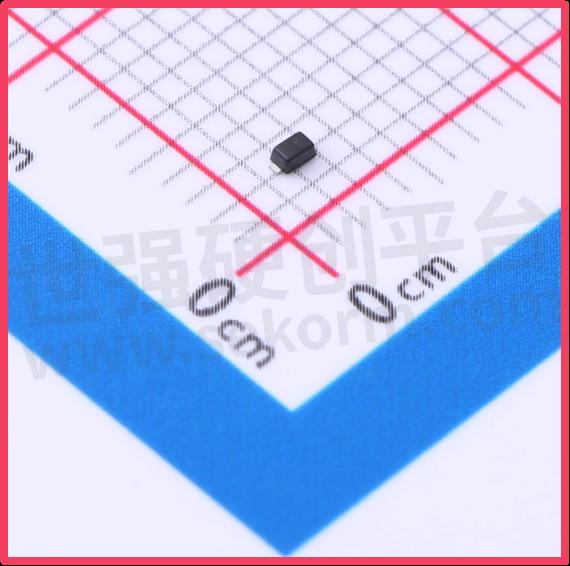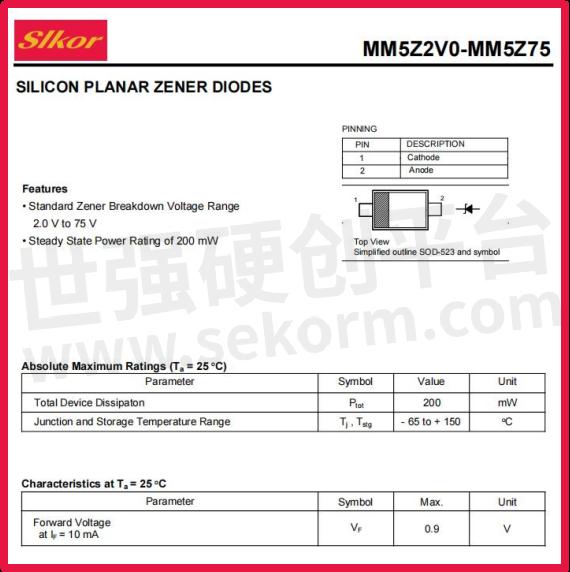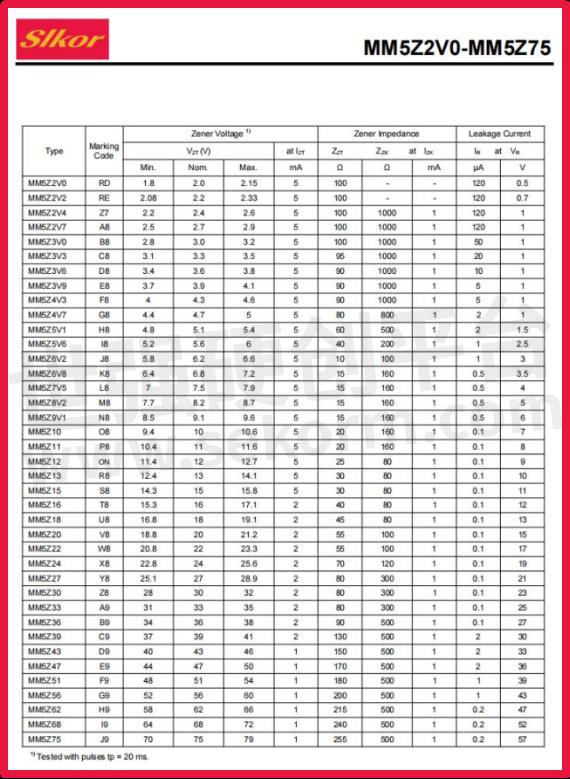Slkor MM5Z5V6 Voltage Regulator Diode: Reverse Current of 1μA, Comply with Certification Requirements in Medical Electronic Devices

In the realm of semiconductor devices, Voltage Regulator Diodes hold an indispensable position due to their unique functions and stability. Today, we will explore the performance metrics of the MM5Z5V6 voltage regulator diode from a fresh perspective, and its application value in the field of electronic engineering.

SLKOR Voltage Regulator Diode MM5Z5V6 product photo
Core Parameter Analysis
Regulation Voltage: The MM5Z5V6 has a nominal regulation voltage of 5.6V, which means it can stably output a voltage of 5.6V in a circuit. Its regulation range spans from 5.2V to 6V, allowing the MM5Z5V6 to adapt to a variety of circuit environments and provide more flexible voltage regulation.
Power Rating: The diode has a power rating of 200mW, indicating its capacity to handle current and voltage. A higher power rating means the MM5Z5V6 can maintain stable operation under high load conditions, providing reliable voltage support for complex circuits.

Slkor Voltage Regulator Diode MM5Z5V6 specification
Reverse Current: The MM5Z5V6 has a reverse current of only 1μA, which is very low. Low reverse current helps to reduce power consumption, increase overall efficiency, and minimize unnecessary heat generation.
Impedance: With an impedance value of 60Ω, the MM5Z5V6 exhibits relatively low resistance in a circuit, thereby reducing voltage drop and power loss. This is crucial for circuits that require precise voltage control.

Parameters of Slkor Voltage Regulator Diode MM5Z5V6
Technical Analysis and Application Prospects
Thanks to its outstanding performance metrics, the MM5Z5V6 has broad application prospects in electronic engineering. Whether ensuring stable power in consumer electronics, providing accurate voltage references in industrial automation, or safeguarding critical circuits in automotive electronics, the MM5Z5V6 demonstrates its unique advantages.
As technology continues to advance, the performance requirements for semiconductor devices are becoming increasingly stringent. The MM5Z5V6 meets the demanding needs for voltage stability in modern electronic systems with its high precision, stability, and low power consumption. Looking ahead, with the adoption of more innovative technologies and advancements in semiconductor processes, we expect to see more high-performance devices like the MM5Z5V6 emerge, driving the continuous development of electronic technology.
Certification Requirements for Voltage Regulators in Medical Electronic Devices
The use of voltage regulator diodes in medical electronic devices must comply with a range of certification requirements to ensure device safety and efficacy. Key certification standards and requirements include:
ISO 13485: This is one of the commonly used standards for electronic medical device manufacturers. It outlines the requirements for a quality management system covering all aspects of device design, development, production, installation, and post-market services. Companies complying with this standard are able to provide high-quality and safe electronic medical devices.
IEC Standards: Set by the International Electrotechnical Commission, these standards guide the design, manufacturing, and use of electronic medical devices. They cover critical aspects such as electrical safety, biocompatibility, and electromagnetic compatibility to ensure devices meet global quality and safety requirements.
FDA Standards: In the United States, the Food and Drug Administration (FDA) has established standards for regulating the sale and use of electronic medical devices. Devices must pass rigorous review processes to ensure safety and efficacy. Similarly, in China, electronic medical devices must be certified by the China Food and Drug Administration (CFDA), focusing on safety, efficacy, and quality consistency.
Additionally, the voltage regulator diode itself may require specific certifications, such as CB certification. This process typically involves selecting an IEC-recognized certification body, submitting an application, testing product samples, evaluating and auditing, and issuing the certification. Sample testing will address regulation characteristics, voltage tolerances, temperature characteristics, and more.
- +1 Like
- Add to Favorites
Recommend
- Slkor MM5Z10V: A High-Quality Voltage Regulator with Impressive Performance
- The Voltage Regulator Diode MM5Z8V2 Features A Maximum Power Dissipation of 200mW and A Stable Voltage Value of 8.2V
- MM5Z3V3 Voltage Regulator Diode: Guardian of Stability in Circuits
- Zener Diode MM5Z15: Technical Specifications and Application Analysis
- How is the Delivery Efficiency of SLKOR?
- In-depth Analysis of Voltage Regulator Diode MM5Z3V9
- The Voltage Regulator Diode MM5Z6V2 with Precision Voltage Regulation Capabilities and Low Reverse Current Characteristics
- Slkor Participated in the 8th Qianren Summit of Dajia Yuan
This document is provided by Sekorm Platform for VIP exclusive service. The copyright is owned by Sekorm. Without authorization, any medias, websites or individual are not allowed to reprint. When authorizing the reprint, the link of www.sekorm.com must be indicated.





























































































































































































































































































































































































































































































































































































































































































































































































































































































